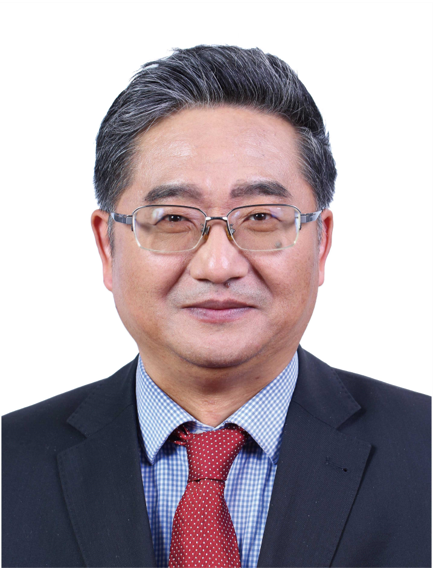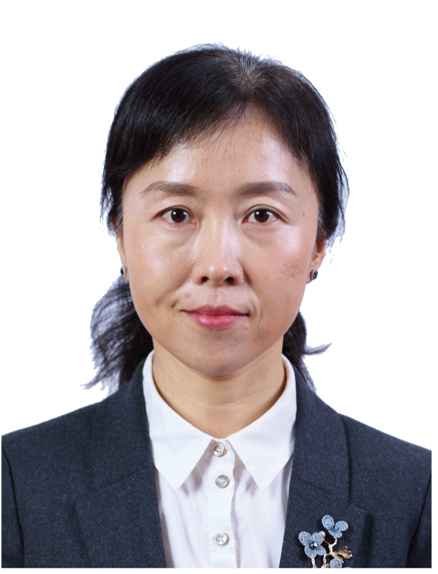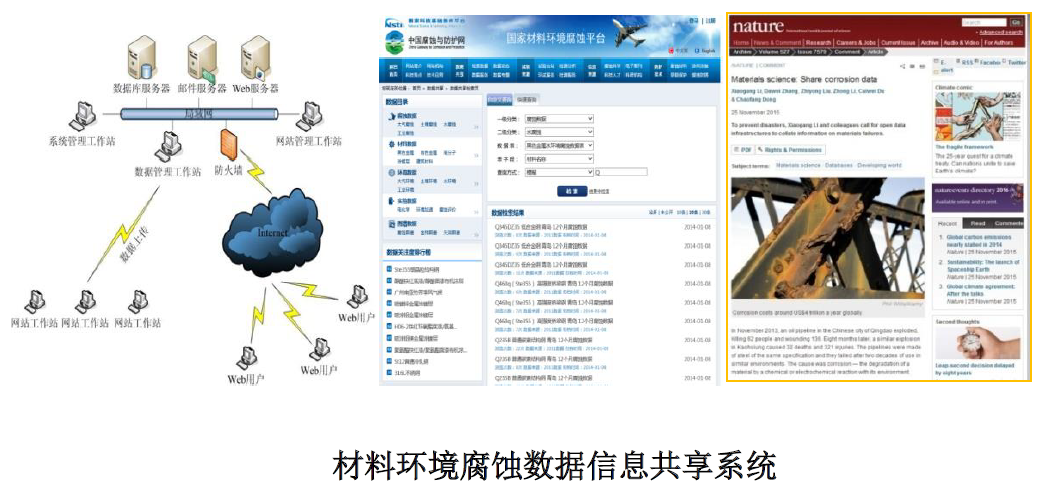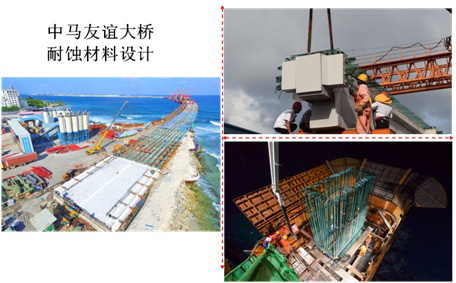Materials Service Big Data Technology
Materials Service Big Data Technology






Li Xiaogang Professor of the University of Science and Technology Beijing, and chief scientist of 973 Project
Du Cuiwei Professor of the University of Science and Technology Beijing
Dong Chaofang Professor of the University of Science and Technology Beijing
Zhang Dawei Professor of the University of Science and Technology Beijing
【Chief Members】
Li Xiaogang Professor of the University of Science and Technology Beijing, and chief scientist of 973 Project
Du Cuiwei Professor of the University of Science and Technology Beijing
Dong Chaofang Professor of the University of Science and Technology Beijing
Zhang Dawei Professor of the University of Science and Technology Beijing
【Research Background】
China’s “Marine Development” and “One Belt, One Road” initiatives put forward higher requirements for bridge steel, oil tanker tank steel, island reef steel, and protective coatings. However, the lack of corrosion resistance has become a key bottleneck restricting improvement in the quality of marine materials. This mainly presents two problems: the long periods needed for corrosion resistance evaluation and the lack of corrosion data from the actual environment. With the development of the Materials Genome Engineering (MGE) discipline, the development of new materials can be accelerated through concurrent computing and integrated computational materials engineering (ICME). Based on the new concept and model of MGE, it is possible to significantly shorten the R&D cycle of new marine materials, improve the quality of the products, and provide technical support for more accurate prediction of the service life of marine engineering materials and equipment.
【Research Objectives】
This new approach is based on the automatic acquisition, accumulation, integration, and application of data across the entire process of computing, testing, and producing ocean engineering materials. The team is committed to conducting R&D on high-throughput test and corrosion resistance evaluation technology, to reveal the inherent relationships between the microstructure and corrosion resistance of marine engineering materials, to optimize the technology needed to control material structural composition, and to overcome the technology bottlenecks hindering multi-scale data modeling and simulation. The team is also committed to establishing high-throughput data acquisition and machine learning technology for the environment of marine engineering materials, for the micro-corrosion behavior of material structures and for the performance of corrosion resistant systems to establish a dedicated database system for shortening the R&D time of high-quality marine engineering materials and for reducing R&D costs.
【Main research areas】
1. High-throughput corrosion data acquisition technology
2. Machine learning technology for corrosion big data
3. Dynamic digital mapping technology for corrosion level
4. Design and R&D of new marine materials
【Significant Research Progress】
1. Material corrosion big data research
Based on a long-term field test of the national material environmental corrosion platform, a large amount of material environmental corrosion data was collected, leading to the establishment of China’s largest material corrosion database. It has the greatest abundance of data and content. The large corrosion database has also led to the formation of a national platform providing a corrosion data sharing service. The team proposed the scientific concept of “corrosion big data,” established a new mode of high-throughput wireless acquisition, processing, and sharing of corrosion data, and established systematic methods for corrosion big data mining. Moreover, a multi-scale simulation model for the evolution dynamics of corrosion behavior was constructed, providing useful exploration and demonstration for the research on material corrosion genome engineering. The outcomes are widely used in marine engineering, electric power, petrochemical industry, transportation, aerospace, and other fields. The team published the world’s first monograph entitled “Material Corrosion Informatics,” and published a commentary paper in the journal Nature titled “Materials science: share corrosion data,” systematically proposing the original academic viewpoint of “corrosion big data” with its theoretical framework and technical mode.

2. R&D on new corrosion-resistant structural steels and their engineering application in the “One Belt, One Road” initiative
Based on long-term data accumulation, the team determined the principle of the effects of alloy elemental content on the initial corrosion of structural steels. They also proposed a new theory that the microstructure of the rust layers in the early stage of corrosion is the key determining factor of corrosion resistance. In addition, they invented a series of new technologies to conduct indoor simulation of harsh environments for accelerated corrosion testing, and were the first to propose a micro/nano-scale structure control technology for corrosion-resistant structural steels and an electrochemical evaluation technology for micro-corrosion. Based on the research results of localized electrochemical characteristics of chloride ion corrosion in the marine environment, the team generated key technologies for whole-process control: from corrosion-resistant alloying control to oxide coating control and to weld structure control. The team developed a series of new varieties of corrosion-resistant steel products jointly with Nanjing Iron and Steel United Co., Ltd. and other enterprises. The products are being used successfully in major projects along the routes of the “One Belt, One Road” initiative such as the China-Maldives Friendship Bridge and projects with the Brazilian company Vale. Some relevant achievements resulted in winning the first prize of the Jiangsu Science and Technology Progress Award.

